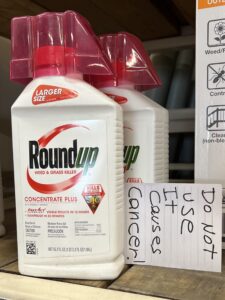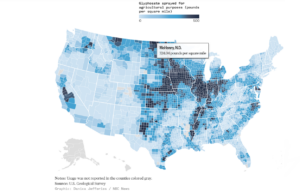Cancer-causing weed killer Roundup has been making headlines. The Bayer-owned product is behind several multimillion-dollar lawsuits, as long-suffering victims are finally seeing justice. In a recent verdict, the plaintiff was awarded $332 million.

If you suspect that your cancer diagnosis is a direct result of using Roundup, read on for more information. We are here to help.
Roundup – a brief and colluded history
In 1970, a chemist for Monsanto named John Franz discovered that glyphosate worked successfully as a weed killer. In 1974, Monsanto brought this product to market, and called it Roundup.
By killing weeds that stole nutrients from major crops, farmers saw a higher yield in produce, and praised Roundup far and wide. In fact, Farm Chemicals Magazine named it one of the “top ten products that changed the face of agriculture.”
However, issues began to surface as early as 1981, as the EPA was made aware that glyphosate was classified as “probably carcinogenic” to humans and as “sufficiently demonstrated” for genotoxicity in animals. Monsanto demanded a retraction of the report before it was even published, and began a full-force damage control campaign.

Photo credit: Forester Haynie
How could Roundup stay on shelves if it was found to be toxic?
In most cases, one only needs to follow the money. Monsanto safeguarded glyphosate because Roundup was a highly lucrative product. The World Health Organization uncovered EPA files that revealed a deal between Monsanto and the EPA to keep the toxicity a “trade secret.” They also found rebuttal research reports conducted by Monsanto in its own self-interest. Perhaps most tellingly, lobbyists for Monsanto paid millions to politicians in Washington – even the most recent Bayer payouts are public information.
The stakes were also high because Roundup had changed American farming itself. By 1996, glyphosate-tolerant crops were being planted commercially across the country. While the newer, genetically-modified plants could better tolerate the chemical, humans could not. This didn’t stop Monsanto from patenting glyphosate as an antibiotic in 2010. By 2014, the use of Roundup had grown exponentially, both domestically and worldwide.

Anti-GMO/Roundup protesters
When did consumers start noticing problems with Roundup?
In 2016, alarming levels of glyphosate were found in American cereals and snacks. The following year, California became the first state in the U.S. to name glyphosate to the state’s Proposition 65 list of chemicals that are known to cause cancer. In 2018, a major lawsuit in San Francisco confirmed fears surrounding this product.
What types of illnesses have Roundup been linked to?
There are myriad health problems linked to exposure to Roundup, causing cancer, reproductive issues, and other diseases. They include:
- Non-Hodgkin Lymphoma
- Leukemia
- Lymphoma
- Premature births
- Low birth weight
- Thyroid disruption
- Liver disease
- Endocrine system malfunction
- Fertility issues
- Tissue damage in male and female reproductive organs
- Congenital anomalies in offspring
- Kidney disease
- Microbiome (gut) disruption
- Neurotoxicity
- Neurological and neurobehavioral disorders
- Anemia
- Depression/anxiety-like behavior

A 2022 map of commercial Roundup use in the U.S.
Major lawsuits against Roundup
There are a multitude of high-dollar settlements and verdicts against Roundup. In 2018, Bayer acquired Monsanto for $63 billion, taking control of their pesticides and agricultural seeds. By 2020, they had settled most Roundup claims for $10.9 billion. But if they believed it would settle the issues once and for all, they were mistaken. They are still facing up to 40,000 claims.
Bayer has tried unsuccessfully to appeal to the U.S. Supreme Court, challenging plaintiffs’ ability to sue them under state law. This would have helped keep payouts lower and profit margins higher. However, the courts sided with the victims.
Some major lawsuits include:
- In November of 2023, four plaintiffs were granted $1.56 billion in damages, charging Bayer with negligence, design defects, and failure to warn of the chemical’s dangers.
- In October of 2023, a California jury ordered Bayer to pay $332 million to a former land surveyor, who blamed his non-Hodgkin lymphoma on the use of Roundup.
- A Philadelphia jury awarded a retired restaurant owner $175 million in damages. Ernest Caranci suffered from non-Hodgkins lymphoma, and claims it was a result of using Roundup in his garden for years. He was given $25 million in compensatory damages, and $150 million in punitive damages against Bayer for their negligence. This took place in October 2023.
- Also in October 2023, a jury in St. Louis awarded $1.25 million to a man who says he had developed non-Hodgkin lymphoma after exposure to Roundup.
- A San Franciso jury awarded a former school groundskeeper $250 million in damages in 2018. The victim experienced pain, suffering, and lost income. He was diagnosed with non-Hodgkin lymphoma, and his body was covered in lesions.
Many of these cases have substantial awards because of the punitive damages – the money that a company must pay for negligence or criminal practices as a punishment. For instance, the $332 verdict (listed above) includes $7 million in compensatory damages (for medical bills, pain, suffering, etc.) and the punitive damages equaled $325 million. However, through appeals processes the punitive damages may be cut sharply. The U.S. Supreme Court has stated that punitive damages should be less than 10 times the compensatory damages in virtually all cases.

What are the symptoms of non-Hodgkin lymphoma?
Though the health issues related to Roundup are vast, non-Hodgkin lymphoma seems to be most prevalent in these cases. The warming signs include:
- Swollen lymph nodes in your neck, armpits, or groin
- Abdominal pain or swelling
- Chest pain, coughing, or trouble breathing
- Persistent fatigue
- Fever
- Night sweats
- Unexplained weight loss
As with any signs of illness, it is best to see your doctor for treatment and a diagnosis.
I have used Roundup and now I am experiencing health issues. What should I do?
People all around the world have suffered the ill effects of Roundup. Monsanto settled over 100,000 cases, and as of May 2022, under the Bayer brand, they have paid out approximately $11 billion so far.
When a company’s route to financial success compromises the health of its consumers, they must be held accountable. Illnesses such as leukemia and non-Hodgkin lymphoma can take an immense financial and emotional toll on a family. No one should have to shoulder the burden alone when the disease is linked to the negligence of another.
The experienced, compassionate product liability attorneys at Allen & Allen understand the nuances that come with taking on multibillion-dollar companies and their powerful insurance representatives. Your focus should be on healing, while our team of lawyers work hard to attain justice on your behalf. For a free case evaluation, call us today, at 866-388-1307. We look forward to your call.



